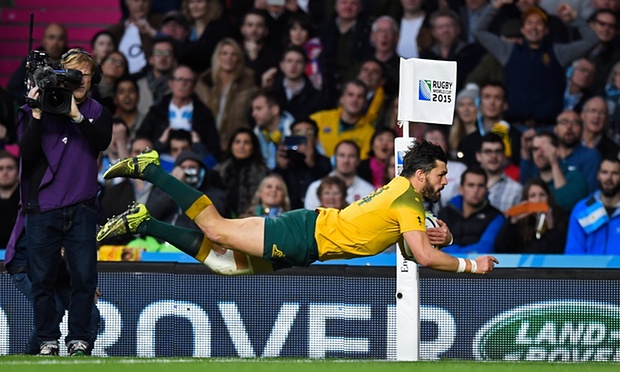



Adam Ashley-Cooper dives in to score the second try of his hat-trick in Australia’s 29-15 win against Argentina in their Rugby World Cup semi-final. Photograph: Dylan Martinez/Reuters
HAD Argentina started the way they finished, like runaway bulls storming across the unfamiliar pampas of south-west London, this would have been one of the great Rugby World Cup knockout games.
Instead an early mixture of suicidal mistakes and overenthusiasm played into Australian hands and ensured it will be the Wallabies, also grateful for a hat-trick of tries from the winger Adam Ashley-Cooper, who face their trans-Tasman rivals, New Zealand, in Saturday’s final.
If four tries to nil sounds like a drubbing on paper, it was rather closer in reality. The second half was a real test of antipodean nerve as the Pumas scrum finally exerted some concerted pressure but Australia had enough strength in depth on the bench to extend their unbeaten record at this tournament. Argentina, who now face South Africa in Friday’s bronze final, suffered a clutch of injuries to some key individuals and there was ultimately no escape from 14-3 down after 11 minutes.
Australia will be pleased at the way they responded when a helter-skelter contest threatened to veer out of control and the All Blacks will not have forgotten their 27‑19 defeat in Sydney in August, which cost them this year’s Rugby Championship title. Steve Hansen’s side, however, have the luxury of an extra day’s recovery time before the first World Cup final to feature the two neighbours.
The Wallabies have not made a final in 12 years and last won one in 1999, when the great John Eales was still captaining them. The current mob are growing in self-belief, though, and possess significant threats in the back row, midfield and wide out, all areas where the All Blacks are strong. With the exception of their quarter-final against Scotland – in which two of the Scots’ three tries came from an intercept and a chargedown – they have defended outstandingly. England, Wales and Argentina managed only one try between them against Australia in 240 minutes; across the tournament, Michael Cheika’s side have racked up 26 tries at an average of 4.33 per game.
Argentina, coincidentally, have precisely the same strike rate and, despite relying solely on Nicolás Sánchez’s five penalties here, have won a host of new friends over the past five weeks. Their supporters create a reliably fabulous matchday atmosphere and this was as vibrant a fiesta as any, particularly in the hours before kick-off. “I can’t give these away,” said the man attempting to hand out Australia flags on the way up from the station. Inside there was enough sky blue and white to make it feel like a Manchester City home game, albeit with rather more audible Spanish.
Advertisement
The sight of Diego Maradona in attendance increased the sense of theatre but, crucially, the scale of the occasion affected the Pumas’ tactical composure. Australia duly took delivery of an early gift, Rob Simmons deftly intercepting an attempted inside ball from Sánchez to scoot over after only 70 seconds and worse soon followed. A botched quick tap from the winger Santiago Cordero put his side under unnecessary territorial pressure and a lovely long floated pass from Bernard Foley released Ashley-Cooper to score on the right.
With David Pocock frequently stealing ball at the breakdown and the Wallabies gang-tackling with gusto in midfield, the Pumas struggled to establish a steady platform. Nor did it help when they lost their star winger Juan Imhoff to injury inside the first quarter and, at 14-6 down, they suffered a further blow when the big lock Tomás Lavanini was sent to the sin-bin for a no-arms tackle on Israel Folau.
The Pumas scrum held out temporarily in Lavanini’s absence but when their captain, Agustín Creevy, also departed the contest injured around the half-hour mark it did not bode well. Sure enough Australia, so good at exploiting opposition uncertainty, snaffled their third try within a couple of minutes, Matt Giteau making a big overlap pay and supplying the unmarked Ashley-Cooper with another inch-perfect pass.
Having also beaten Argentina 34-9 in the previous meeting between the sides in Mendoza in July, Cheika’s team seem to enjoy playing the Pumas. The inside knowledge of Mario Ledesma, their forwards coach, has clearly done no harm but when Pocock plays, fully fit or not, he visibly lifts everyone else in green and gold. Scott Fardy and Michael Hooper, playing his 50th Test, complement his strengths perfectly and behind the scrum Foley continues to surpass the expectations of those who thought he might prove a weak link.
Advertisement
If his side’s 10-point half-time cushion could have been reduced had slicing breaks by Cordero and Marcelo Bosch yielded more than a single penalty between them, players such as Kurtley Beale and Matt Toomua are great assets off the bench. Even when Sánchez chipped over his fifth penalty to peg the score back to 22-15, Australia did not panic and Ashley-Cooper’s third try, eight minutes from time, created by Drew Mitchell’s mazy break,, duly secured his nation a place in a World Cup final for the fourth time.
Argentina, who also lost Juan Martín Hernández and their forceful No8 Leonardo Senatore prematurely, can at least console themselves that the future is bright. The vast majority of this Pumas side will be back in 2019 and their introduction in Super Rugby will also help their development. This was their 11th loss to the Wallabies in their last 12 meetings but any hint of an inferiority complex has gone. Australia, similarly, do not have a great modern record against the All Blacks but this starting lineup contained a combined 876 caps, making it the most experienced Wallaby XV for any World Cup fixture. New Zealand will be favourites to defend their title but Richie McCaw and co can take nothing for granted.
Australia: Tries Simmons, Ashley-Cooper 3. Cons Foley 3. Pen Foley.
Argentina: Pens Sánchez 5.
Att 80,025.